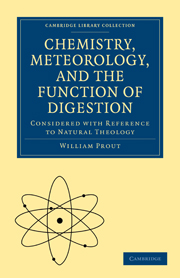Book contents
- Frontmatter
- TO THE READER [FIRST EDITION]
- TO THE READER [SECOND EDITION]
- Contents
- Dedication
- INTRODUCTION
- BOOK I OF CHEMISTRY
- CHAPTER I OF THE MUTUAL OPERATION OF PHYSICAL AGENTS AND OF MATTER, AND OF THE LAWS WHICH THEY OBEY
- CHAPTER II OF THE INERTIA AND ACTIVITY OF MATTER
- CHAPTER III OF MOLECULAR OR POLARIZING FORCES, ETC
- CHAPTER IV OF CHEMICAL ELEMENTARY PRINCIPLES, AND OF THE LAWS OF THEIR COMBINATION
- BOOK II OF METEOROLOGY
- BOOK III OF THE CHEMISTRY OF ORGANIZATION
- APPENDIX
CHAPTER II - OF THE INERTIA AND ACTIVITY OF MATTER
Published online by Cambridge University Press: 29 August 2010
- Frontmatter
- TO THE READER [FIRST EDITION]
- TO THE READER [SECOND EDITION]
- Contents
- Dedication
- INTRODUCTION
- BOOK I OF CHEMISTRY
- CHAPTER I OF THE MUTUAL OPERATION OF PHYSICAL AGENTS AND OF MATTER, AND OF THE LAWS WHICH THEY OBEY
- CHAPTER II OF THE INERTIA AND ACTIVITY OF MATTER
- CHAPTER III OF MOLECULAR OR POLARIZING FORCES, ETC
- CHAPTER IV OF CHEMICAL ELEMENTARY PRINCIPLES, AND OF THE LAWS OF THEIR COMBINATION
- BOOK II OF METEOROLOGY
- BOOK III OF THE CHEMISTRY OF ORGANIZATION
- APPENDIX
Summary
To form a notion of what is termed the inertia or inactivity of matter; let us imagine a portion of it, as, for example, a ball of lead A, detached from all other matter, and existing absolutely uninfluenced in space. Such a mass of matter, if supposed to be at rest, must obviously remain so, for it cannot move itself; on the other hand, if it be supposed to be in motion, it must continue in motion; for it cannot be conceived to be able to stop itself, any more than it could be conceived to be able to set itself in motion: in short, a mass of matter under such circumstances of isolation, must be considered as perfectly passive and unable to change its state, whatever that may happen to be, whether of motion or of rest. Now let us suppose another portion of matter, as, for example, another ball of lead B, exactly of the same size as A, placed in free space at any moderate distance from A, and away from all other influences; what will happen? General experience teaches us, that under these circumstances, the two balls will mutually approach each other with an equal, but accelerated motion, till they meet at a point, exactly intermediate to those at which they first started; and the inference from this experience is, that the two balls exert a mutual and equal attractive force, which causes them to move towards each other.
- Type
- Chapter
- Information
- Chemistry, Meteorology and the Function of Digestion Considered with Reference to Natural Theology , pp. 27 - 30Publisher: Cambridge University PressPrint publication year: 2009First published in: 1834



